Interviews on “poetry & refugees” – 3 – Ali Al Jallawi
Ali Al-Jallawi was born in Bahrain in 1975. He lives in Berlin today.
Lyrikline Blog (LB): Where do you come from and why did you leave your country of origin?
Ali Al-Jallawi (AA): I’m from Bahrain, and I left my country back in 2011, when I felt unsecure. When the Bahraini regime announced the emergency law in the state, the Saudi and the Emirati troops invaded the streets of Bahrain, they were responsible of suppressing the protests, arresting protesters and killing people on the streets, I broke away from home to live a life.
LB:In your view, is it the task of a poet also to be a chronicler or witness of his/her time?
AA: The poet is a mirror which reflects what is around him, reflects what he feels, what affected him, and what aspires him. He might be a witness, but without having the obligation of being one.
LB: What impact on society or politics can a poem have? Do oppressive regimes have to fear poetry?
AA: The tyrannies are terrified of everything that is beautiful, anything that provokes freedom, or incites erosion of their area of influence. The real poem consciously or unconsciously exposes and uncovers these systems, with a direct or indirect language. The dictator loves poetry (more…)
Celebrate the new site with us – Relaunch Event on 1 Sept!
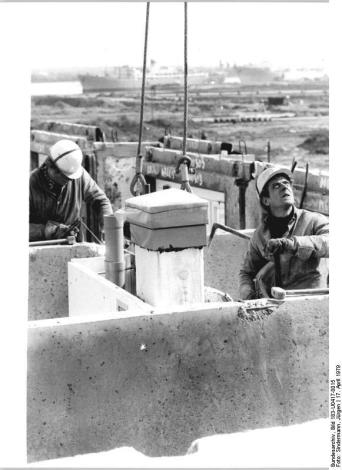
Dear friends of lyrikline,
be there on Sunday, 1 Sept at 7pm (CEST) when the new lyrikline will be going online! We cordially invite you to celebrate with us and watch the event live stream on www.lyrikline.org. Heiko Strunk, the lyrikline project manager, will give us a tour of the relaunched website and all its new features and functions, we will link to partners in Nigeria, Russia and Slovenia via video, publish many new poets on the site and we will have six great lyrikline poets on stage, two of them to be published on the relaunch day:
Simen Hagerup (Norway), Els Moors (Belgium), Steffen Popp (Germany), Pedro Sena-Lino (Portugal), Helena Sinervo (Finland) and Jan Wagner (Berlin). The lyrikline network partners Joel Scott (Australia) and Per Bergström (Sweden) will present the event.
You are invited not only to watch the event but to comment on facebook, on twitter (seems #llrelaunch is a suitable hashtag) and hopefully (still working on making this possible) also chat with us and some of the poets of the event.
The event physically takes place at ‘c-base – ›Raumstation unter Berlin Mitte‹ (Space station beneath Berlin-Mitte)’, a friendly place for IT and open source people, who kindly took us in. The languages of the event will be English and German mainly, but we’ll hear a bit of Portuguese, Russian, Dutch, Norwegian and Finnish too.
See you on Sunday!
We’re excited…
The relaunch of the website has been made possible by a grant from the German Lottery Foundation, Berlin.
The event is taking place with the kind support of: c-base, Institut Ramon Llull, Royal Norwegian Embassy Berlin, Rámus Förlag, Malmö and the Swedish Embassy
The place where I write: Klaus Peter Dencker [Germany]
My working-place can be everywhere. I only need my set of instruments to perform an autopsy on images, texts and letters on the stage of my DIN A 4 white paper. Also I need several magnifying glasses for my eyes and the possibility to look behind all the material I am working with. I am not speaking about storerooms, cupboards, drawers and receptacles with lots of this material I am dealing with.
Klaus Peter Dencker, Ahrensburg/Germany
“Theorie” is the biggest paper I ever did, ca. 85 x 60 cm.
At the same time it is theory, biography and poetry.
First published in: Klaus Peter Dencker, Optische Poesie. Berlin 2011.
Advent Calendar – 23
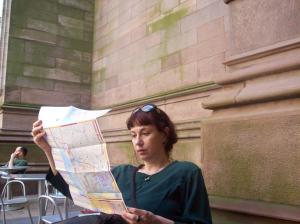
Olga Martynova
New poetry from cold regions. Today’s poet was born 300 km north of the Arctic Circle in the north-eastern part of the West Siberian Plain. She grew up in Leningrad (Saint Petersburg) and moved to Germany in 1991. She writes poetry in Russian and prose in German and is an essayist in both languages. Behind the 23rd Advent Calendar window you’ll find the poetry of
Olga Martynova
(with translations into German and Swedish)
Born in 1962 in Dudinka, Russia, Olga Martynova studied Russian language and literature and works as a writer, critic and translator. For her German text Ich werde sagen: „Hi!“ she won the prestigious Ingeborg Bachmann prize in Klagenfurt, Austria. She writes for magazines and newspapers like “Die Zeit” and “Neue Zürcher Zeitung” and lives in Frankfurt am Main together with her husband, the Russian poet, novelist and playwright Oleg Yuriev.
Advent Calendar – 11
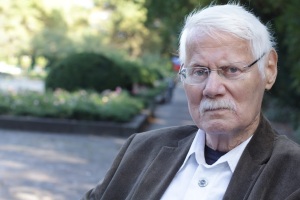
Rolf Haufs, photo: gezett.de
“Perhaps the ‘big unknown’ among our contemporary poets, but certainly one of the most meaningful.” says a German critic about our new poet. Today, we don’t travel far for our Advent Calendar but stay in Berlin, where not only lyrikline.org is based, but also the poet behind calendar door number 11,
Rolf Haufs
Born in 1935 in Düsseldorf, Germany, Rolf Haufs works as a writer of poetry, short stories and radio plays since 1960. From 1972, he was the literary editor of ‘Sender Freies Berlin’ radio station. Haufs is a witty observer of contemporary life. While in his early works addressing his hometown Berlin plays an important role, his later poetry is marked by melancholy.
Ulf Stolterfoht zum Stellenwert der Poesie heute
 Heute, Mitte März 2010, können im gesamten deutschsprachigen Raum genau 4 (vier) DichterInnen von ihrer Lyrik leben (Namen auf Anfrage). Diesen Vieren also gelingt es, die verbliebene poetische Nachfrage komplett abzudecken. Was darüber hinaus von Nebenerwerbs- und Hobbylyrikern produziert wird, geschieht jenseits irgendeines Bedarfs. Das wäre nun alles gar nicht schlimm, nur gerät so jeder poetologische Versuch automatisch zu einer gesellschaftlichen Zustandsbeschreibung. Es werden wahrscheinlich weiterhin Gedichte geschrieben werden, allerdings werden wir keinen gemeinsamen Begriff mehr davon haben, was ein Gedicht ist oder sein könnte. Wittgensteins Käfer. Solipsismus und/oder Hartz IV. Dazu dann auch noch das schreckliche Berliner Bier.
Heute, Mitte März 2010, können im gesamten deutschsprachigen Raum genau 4 (vier) DichterInnen von ihrer Lyrik leben (Namen auf Anfrage). Diesen Vieren also gelingt es, die verbliebene poetische Nachfrage komplett abzudecken. Was darüber hinaus von Nebenerwerbs- und Hobbylyrikern produziert wird, geschieht jenseits irgendeines Bedarfs. Das wäre nun alles gar nicht schlimm, nur gerät so jeder poetologische Versuch automatisch zu einer gesellschaftlichen Zustandsbeschreibung. Es werden wahrscheinlich weiterhin Gedichte geschrieben werden, allerdings werden wir keinen gemeinsamen Begriff mehr davon haben, was ein Gedicht ist oder sein könnte. Wittgensteins Käfer. Solipsismus und/oder Hartz IV. Dazu dann auch noch das schreckliche Berliner Bier.
Ulf Stolterfoht, Deutschland
– – –
Today, the middle of March 2010, exactly 4 (four) poets in the German-speaking world are able to live from their verse alone (names on request). These four therefore succeed in supplying all remaining poetic demand. All that is being produced besides that, from hobby and part-time poets, is being produced beyond what is needed. That in itself would not be so bad if it didn’t mean that every attempt at an individual poetic statement automatically leads to a description of contemporary society. Poems will probably be continued to be written, although we will no longer have a common definition of what a poem is or could be. Wittgenstein’s “Beetle”. Solipsism and/or HARTZ IV. And in addition, the horrible Berlin beer.
Ulf Stolterfoht, Germany
[Translated by Rebecca Bartusch/Marisa Pettit]
The Anniversary Week Chain Poem

gezett.de
For the final event of lyrikline’s anniversary week we asked the poets who read on Oct31 whether they’d like to write a chain poem together in the weeks before the event and present it on stage together. Six of the poets took part in this project: Daniel Samoilovich (Argentina), Babangoni Chisale (Malawi), Lutz Seiler (Germany), Remi Raji (Nigeria), Elke Erb (Germany), and Thomas Möhlmann (The Netherlands).
We have drawn the order of the poets by lot. Each of them wrote 5 lines and sent them, together with all the previous lines, to the next one. The poets decided to go for a second round with Lutz Seiler closing the circle on Oct30. Everyone was free to write in the languages of their choice. Here is the result of six weeks of poetic exchange (including the German/English translations in Italic):
THE CHAIN POEM
1 Daniel Samoilovich
A root of heliotrope on Mars
produced a siren on the Moon.
There is a noisy waking up
of the dominoes knocked over
in triumph on the table.
Die Wurzel einer Sonnenwende auf dem Mars
schuf eine Sirene auf dem Mond.
Lautes Erwachen
der Dominosteine, triumphierend
angestoßen auf dem Tisch.
2 Babangoni Chisale
This small world
Multitude queue for justice, peace and fairness
Decision makers unconcerned
Unconsciousness of the masters pinches servant’s souls
But life is worthwhile with justice, equity and fairness
Diese kleine Welt
Menge steht Schlange für Gerechtigkeit, Frieden und Fairness
Gleichgültige Entscheider
Besinnungslosigkeit der Herren quält die Seelen der Knechte
Doch mit Gerechtigkeit, Gleichheit und Fairness lohnt Leben die Mühe.
3 Lutz Seiler
aber zuerst – ein kriegsherbst, wenn die dinge schon
von einem nerv durchzogen sind, entzündet an der luft. die treibjagd
holt über dem acker die schwerkraft
der gleise entfernungen schrumpfen & wer gerade unterwegs
gewesen ist, verschwindet in seinen gedanken
but first – a wartime autumn, when things were already
run through by a nerve, kindled on the air. the hunt
fetches the gravity of the tracks across
the field distances shrink & whoever was already on
the way, disappears in his thoughts
4 Remi Raji
There is a noisy waking in the silence…
Men walk in the thickets of their thoughts
Some blessed to be thorns, some cursed to thrive.
The world runs a race on crooked limbs
And one deaf foot does not tell the other.
Da ist ein lautes Erwachen in der Stille…
Menschen wandern im Dickicht ihrer Gedanken
Einige gesegnet Dornen zu werden, andere verflucht zum Blühen.
Die Welt im Wettlauf auf gebeugten Gliedern
Und ein tauber Fuß erzählt nicht dem andern…
5 Elke Erb
Maria durch den Dornwald ging
und der Glaube versetzte die Berge
Wessen Ohr ein Herz hat
kann Geflüster hören
und Tauben gurren
Maria walks amid the thorn
and faith moved the mountains
Whose ears have a heart
may hear a whispher
and doves coo
6 Thomas Möhlmann
Roses on the thorns appear and I
thank god that you’re around to tell me
nothing’s wrong and I should simply raise
one foot after the other, keep on walking
even when the thorns start wearing roses
Aus den Dornen blühn Rosen und ich
danke Gott, dass du hier bist mir zu erklären
alles in Ordnung und ich soll nur einen Fuß
vor den anderen setzen, weitergehen, auch
wenn die Dornen beginnen Rosen zu tragen
7 Daniel Samoilovich
and cooings wearing doves.
und Gurren Tauben trägt.
8 Remi Raji
finally, the mountain will appear to you
as the happy path, the valley of dreams
you will walk, away from the war game, with me
into the new ceremonies of light and love.
Even the birds are singing differently, because of you.
Zuletzt wird der Berg dir als der frohe
Pfad erscheinen, das Tal der Träume
du wirst gehen, aus dem Kriegsspiel, mit mir
in die neuen Riten von Licht und Liebe.
Auch die Vögel singen anders, weil du.
9 Babangoni Chisale
In the thicket of desperation
Broken thoughts mingles with empty heart
Drilling anxiety, depression and marauding tears
AS construction of hope progressing
Patience heals the wounds and gouges a way through
In der Verzweiflung Dickicht
Mischen zerbrochene Gedanken sich mit leerem Herzen
Nagender Furcht, Depression und marodierenden Tränen
Als ein Konstrukt nicht endender Hoffnung
Heilt Geduld die Wunden und bahnt einen Weg
10 Elke Erb
Wie die Verzweiflung das Dickicht hat,
so hat das Tal Berg und Berg.
Die Berge aber, sieht es, haben einander.
Wer sprechen kann, kann sich zweifellos fragen,
ob das Leiden das Leiden heilt.
As desperation has the thicket,
so the valley has mountain and mountain
But the mountains, it sees, have each other.
Whoever can speak can ask themselves without a doubt,
whether suffering heals suffering.
11 Thomas Möhlmann
So like snowballs I throw new pain
at you, it’s only medicine my dear,
like two giant mercies, like two marble
mountain tops gazing at each other, like
nothing’s wrong: I should simply raise one foot.
Werfe ich so neuen Schmerz wie Schneebälle
auf dich, es ist nur, Liebe, Medizin,
wie zwei gigantische Gnaden, wie zwei marmorne
Berggipfel die einander anstarren, wie
alles in Ordnung: Ich soll nur einen Fuß –
12 Lutz Seiler
über die täler und berge redest du nicht wie
das licht über die vögel spricht. aber auch draussen
war etwas wie drinnen, unter dem fenster
die strasse herunter gewunkene lieder, sie sagen:
wir hätten das bein an die zeit gebunden
of the valleys and mountains you do not speak like
the light speaks of the birds. but then outside
something met the inside, under the window
songs beckoned down the street, they say:
we tied our legs up to time
Translations by: Steffen Popp, Lutz Seiler, Daniel Samoilovich, Juliane Otto, Melita Aleksa, Marisa Pettit
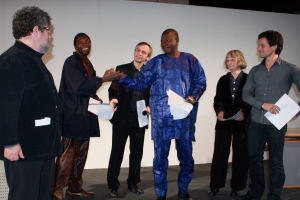
gezett.de




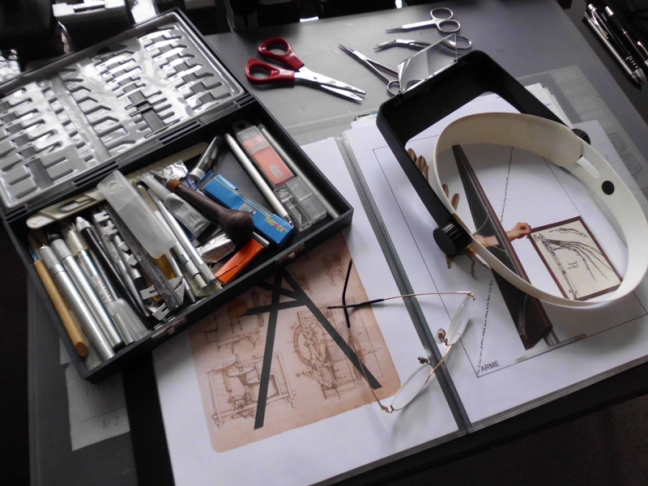




leave a comment